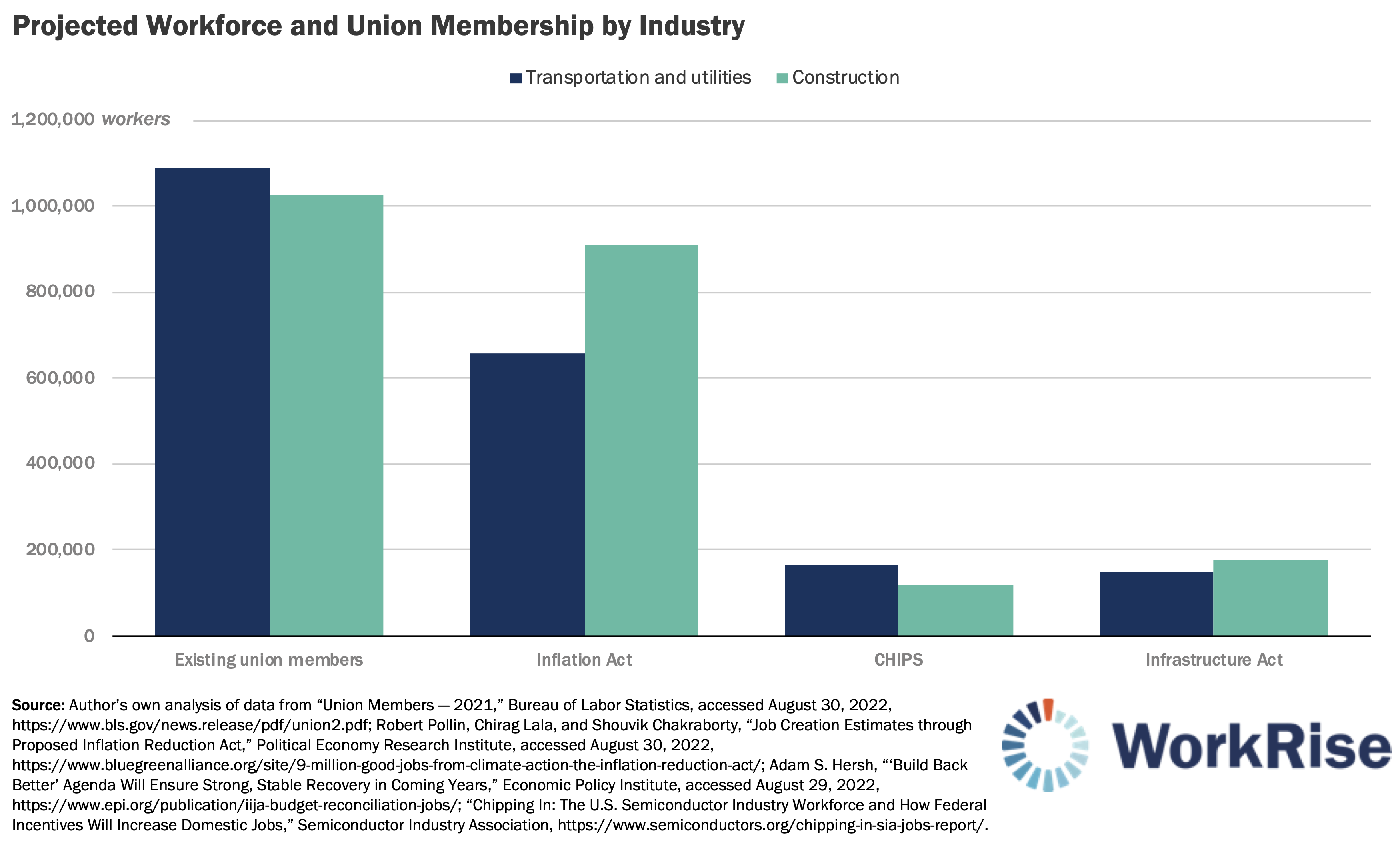New US Industrial Policy Creates Incentives for High-quality Jobs

SDI Productions via Getty Images

Connecting state and local government leaders
COMMENTARY | The last few years have been big for federal industrial policy, funneling billions into industries that have historically been union-friendly and well paying. Here's how those laws can change the labor market for the better.
This article was originally published by WorkRise, a research-to-action network on jobs, workers, and mobility hosted by the Urban Institute.
The recent passage of the Inflation Reduction Act caps a trifecta of large-scale, industrial policy wins by the Biden administration. Alongside the Bipartisan Infrastructure Law and CHIPS and Science Act, the IRA could shape the labor market in ways that benefit both workers and employers in industries poised for growth.
The new laws will send significant amounts of federal money into industries that have a long history of providing well-paid jobs with strong benefits, boosting demand for workers within these industries and expanding access to good jobs. Through a combination of traditional methods, like prevailing wage provisions, and more creative methods, like clean energy tax credits, the laws encourage employers to pay their workers a fair wage and expand apprenticeship opportunities. The IRA goes further still by linking federal investments to job-quality improvements, even for strictly private initiatives.
Increasing Jobs in Union-dense Industries
With union participation among U.S. workers at a historic low, the recent raft of industrial legislation could slow this decline, particularly for workers without college degrees. Although the private-sector union membership rate lingers at 6.1% nationally, the unionization rate in industries targeted by these laws are higher: 12.6% in the construction industry and 15.4% in the transportation and utilities industry, increasing the likelihood that jobseekers hired for projects funded by the laws will be working with union protections (even if they choose not to become a union member).
It’s hard to know exactly how many jobs might be created by these investments, but information from the Bureau of Labor Statistics and Impact Analysis for Planning software (both used in the research linked below) can at least give us an idea of the potential magnitude of change in the workforce.
The infrastructure law alone could increase the share of infrastructure jobs from 11% to 14% of all jobs in the U.S. economy. Federal money in the IRA could incentivize up to 910,000 jobs over the next decade in the construction industry alone, as the CHIPS Act could with 120,000 jobs in construction over the next five years.
In the transportation and utilities industry—one of the most unionized in the US—the infrastructure law and IRA could encourage 150,000 and 658,000 jobs respectively over the next 10 years, while CHIPS could incentivize 165,000 jobs in the next 5 years. If unionization rates remain the same, these three laws could help fund around 300,000 new union jobs in construction, transportation, and utilities.

If the manufacturing industry is included in this equation (which has a slightly higher unionization rate than the U.S. average), the projected 3.6 million jobs in construction, transportation and utilities, and manufacturing could lead to 400,000 new union jobs.
But these laws improve job quality and protections across the U.S. beyond bolstering jobs in union-heavy industries.
Building on Davis-Bacon Precedent
One difference between the infrastructure and CHIPS law and the IRA is that the first two passed with bipartisan support while the latter passed along partisan lines. However, they all incorporate the Depression-era Davis-Bacon Act to ensure workers in jobs funded by these bills are paid a fair wage.
Signed in 1931, Davis-Bacon ensures workers involved in federally funded construction projects are paid the local prevailing wage. This means workers must be paid at least the same wage earned by the majority of similar workers in the same area. In practice, this means workers hired for infrastructure-law-funded projects will likely be paid the same amount as local union workers—regardless of whether they belong to a union. The Davis-Bacon Act helps standardize pay across union and nonunion workforces.
The IRA Includes Additional Incentives for Private-sector Companies
The IRA goes beyond both the infrastructure and CHIPS laws through additional incentives for creating higher-quality jobs. While the Davis-Bacon Act ensures that public, federally-funded construction projects pay the prevailing wage, the IRA creates incentives for companies to pay their employees a prevailing wage, even on nongovernment projects.
The IRA does this by closely linking clean energy tax credits with specific practices aimed at raising job quality: paying prevailing wages and hiring registered apprentices. The IRA’s requirement that government-approved apprentices must be considered for construction jobs will encourage skill development and learning among apprentices. Research shows apprenticeships increase access to decent jobs, particularly among the low-wage labor force.
If a company pursues clean energy without pursuing these policies, then the value of the credits decreases from 30% to 6%. They can capture the credit’s full value if they also implement these equitable labor practices. This novel mix of incentives is not only more expansive than the prevailing wage requirements in older legislation but also applies to public and private investments alike.
Pursuing a Climate and Good Jobs Agenda
Growing awareness of both the climate crisis and low labor-market mobility have moved the federal government to revitalize industrial policy to remedy these problems, signaling a departure from the hands-off approach of the past 30 years.
The administration’s approach to industrial policy will likely raise unionization rates across different industries and elevate pay, even when newly hired workers aren’t union members. Higher labor standards will benefit the low-wage workforce, including those with fewer skills. Higher union-level pay will also benefit Black and minority workers, who constitute a significant portion of the low-wage workforce.
The IRA is also the most important piece of climate legislation in recent history. The administration has made clear that pursing clean energy and raising job-quality standards can be part of the same strategy.
The government is taking the lead, as many companies have turned to green investment recently without increasing labor standards. If policymakers want to leverage industrial policy to reduce financial, educational, and racial inequalities, recent legislation offers an avenue. By incentivizing investments in high-quality jobs, policymakers can reduce inequality without putting undue pressure on businesses. Now, as states turn to writing their complimentary legislation—such as New York’s recent Green CHIPS legislation, California’s Clean Energy Jobs and Affordability Act, and Rhode Island’s effort to temper the climate emergency—they might include similar provisions to protect workers and raise labor standards. That way, legislators can ensure a greener, cleaner economy also means quality jobs.
Joe Peck is a research assistant at the Urban Institute.

NEXT STORY: Can AI Tutors Give the Nation’s Workforce a Competitive Edge?


